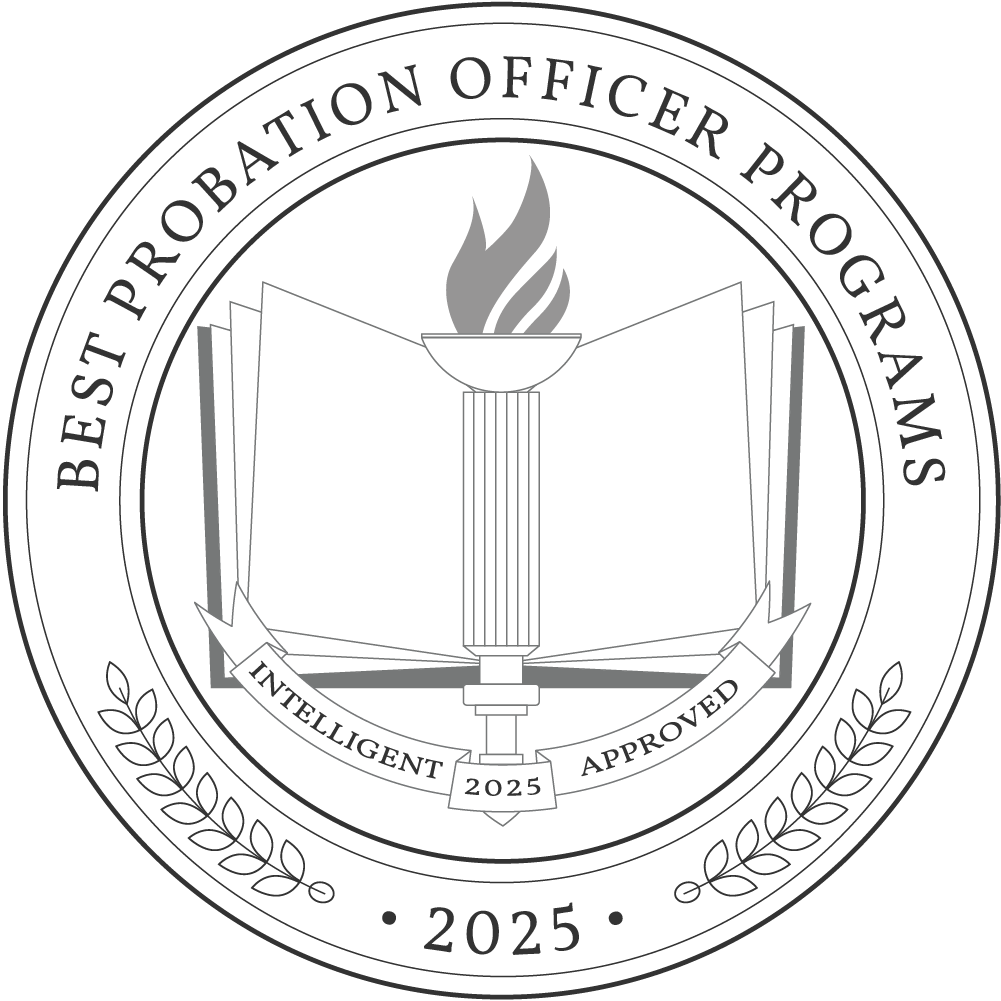Probation officers provide investigation and service duties within law enforcement, judicial review and consultation, and chemical dependency remediation that benefit the court, community, and individual. They ensure probationers do not violate the terms of their probation and help rehabilitate offenders to decrease recidivism rates.
Correctional treatment specialists and probation officers can earn an average yearly salary of $61,800 in a career with a stable job outlook. Completing the requisite bachelor’s degree to become a probation officer can take up to four years, and completing a postgraduate degree takes about two years. The yearly tuition is $27,300, and the costs vary between public, private, and online schools.
Why Trust Us
The Intelligent.com Higher Education Team is dedicated to providing students with independent, equitable school and program rankings and well-researched resources. Our expert-driven articles cover topics related to online colleges and programs, paying for school, and career outlooks. We use data from the U.S. Department of Education’s College Scorecard, the National Center for Education Statistics, and other reputable educational and professional organizations. Our academic advisory team reviews content and verifies accuracy throughout the year for the most current information. Partnerships do not influence rankings or editorial decisions.
- Analyzed over 2,000 national, accredited, and nonprofit colleges and universities
- 800+ rankings pages are reviewed and updated yearly
- Content is informed by reputable sources, surveys, and interviews with academic advisors and other experts
- Over 100 data points are reviewed for accuracy and quality throughout the year, including sources
How we rank schools
Our list features the best Probation Officer programs at top colleges nationwide. Each school featured is a nonprofit, accredited institution — either public or private — with a high standard of academic quality for post-secondary institutions.
We evaluated each school’s program on tuition costs, admission, retention and graduation rates, faculty, reputation, and the student resources provided for online students. We collected data from trusted sources like the National Center for Education Statistics, individual school and program websites, school admissions counselors, and other data sources. Then, we calculated the Intelligent Score on a scale of 0 to 100 based on the following criterion:
Academic Quality:
- Admission rate versus enrollment rate
- Retention rate of students who return after year one
- Accreditation status (regional and programmatic)
- Nonprofit status, both private and public institutions
Graduation Rate
- Overall graduation rate
- Total number of currently enrolled students, including diversity metrics
- Student-to-faculty ratio
Cost and ROI
- In-state and out-of-state per-credit tuition rates and fees
- Required credits to graduate
- Earning potential after graduation
- Availability of federal student loans, scholarships, and other financial aid options
Student Resources
- Available student services for online-only and hybrid programs
- On-campus amenities like tutoring centers and the number of libraries
Read more about our ranking methodology.
Best 4 Accredited Probation Officer Degree Programs
FiltersInstitution Type
Status
- Intelligent Score
- Alphabetically By University Name
- Acceptance Rate
- Enrollment
- In-state Graduate Tuition
- Out-of-state Graduate Tuition
- In-state Undergraduate Tuition
- Out-of-state Undergraduate Tuition

University of South Florida
Intelligent Score: 98.01In-state: $4,559
Out-of-state: $15,473
In-state: $8,350
Out-of-state: $8,350
SAT: 1160-1320
ACT: 25-30
Resident: $209 - $211
Non-Resident: $573 - $575
On-Campus
Southern Association of Colleges and Schools Commission on Colleges
120

Howard University
Intelligent Score: 96.28In-state: $26,464
Out-of-state: $26,464
In-state: $32,248
Out-of-state: $32,248
SAT: 1130-1260
ACT: 22-26
$1,370
On-Campus
Middle States Commission on Higher Education
120

San Jose State University
Intelligent Score: 94.89In-state: $5,742
Out-of-state: $17,622
In-state: $7,176
Out-of-state: $7,176
SAT: 1010-1240
ACT: 19-26
Resident: $277
Non-Resident: $673
On-Campus
Western Association of Schools and Colleges Senior College and University Commission
120

Coppin State University
Intelligent Score: 93.06In-state: $4,648
Out-of-state: $11,045
In-state: $6,192
Out-of-state: $6,192
SAT: 820-970
ACT: 17-22
Resident: $209
Non-Resident: $652
On-Campus
Middle States Commission on Higher Education
120
How to Choose a Probation Officer Program
Choose your area of study
When choosing the best program, consider your career and personal goals. Several different degrees can prepare you for a career as a probation officer, including a Bachelor of Science or Bachelor of Arts in psychology, social work, law, and sociology, though the most common is criminal justice.
While the minimum degree requirement is a bachelor’s, some employers seek applicants with advanced life, education, and career experience. A Master of Social Work or Master of Science in criminal justice are degrees with the potential to diversify your knowledge and expand your career options.
Research schools and programs
It’s important to review the accreditation of your potential school and program. Accrediting bodies such as the Council for Higher Education Accreditation determine the quality and validity of the education provided. Accreditation can influence your ability to receive government aid and transfer credits to other institutions, and some employers prefer hiring graduates from accredited schools and programs.
To get a sense of the culture of a school or program and the support offered, make an in-person visit or attend an open house. If you’re considering an online program, closely review the website, follow the school or program’s social media accounts, and attend a virtual open house or information session.
Prepare for tests and applications
Although the application process varies by institution, requirements generally include the following items:
- Official transcripts
- Letters of recommendation
- A personal statement or essay
Students entering an undergraduate program may need to submit their SAT or ACT scores, and graduate students might need to submit GRE scores.
Most schools use an online application system with step-by-step prompts, and some also have a 24/7 chat box feature to assist with questions. Contact the program administrator for the most accurate application information.
Select your program
Before making your final selection, review your goals and needs. This is especially important if you receive acceptance to multiple schools.
Your best choice should align with your short and long-term career goals while accommodating your logistical needs. Compare full-time, part-time, and online options to see which program fits your schedule. Consider your learning style — do you learn better in groups or alone, in a self-paced or tracked syllabus, or in an asynchronous or synchronous online model? Understanding your needs can help you get the most out of your education.
Determine how you’ll pay for your degree
Complete the Free Application for Federal Student Aid (FAFSA) to qualify for need-based federal and state financial aid. Institutions also review your FAFSA application to determine your eligibility for grants, scholarships, and loans.
You can also check with your employer to see if they participate in an employee tuition reimbursement program as part of their benefits package. Eligibility in these programs is usually based on your work performance and might involve a term contract postgraduation.
What Can You Expect From a Probation Officer Degree Program?
Graduates from a probation officer degree program can expect to learn state, federal, and constitutional law, information systems, counseling, juvenile psychology, and clinical treatment for mental illness and drug dependence.
It can take up to four years to complete the 120 credits required for a bachelor’s and up to six years to complete the additional 30 to 60 credits for a master’s degree. Expect a combination of lectures, cornerstone projects, research papers, and lab or clinic hours, depending on your major. A career as a probation officer can be physically demanding, and physical education courses may be part of the curriculum.
In 39 states, probation officers are considered peace officers. As such, they have the authority to carry firearms and make arrests and must, therefore, complete extended training in law enforcement communication, firearms training, weapons retention and disarming, and controls and restraints through local police or law enforcement academies.
Potential courses you’ll take in a probation officer degree program
- Drugs and Alcohol in the Criminal Justice System. Students learn the history of drug use and abuse, how to identify use and misuse, the differences between the classes of legal and illegal drugs, the impact of drug use on the human body, and current treatment and prevention strategies. This course also examines different theoretical explanations for drug use and abuse, drug legislation, and law enforcement’s response in America.
- Correctional Alternatives. Students will examine alternatives to incarceration in America and learn about evidence-based strategies that promote successful social reintegration. Topics include ethical responsibilities, the use of technology within community corrections, and effective multidisciplinary collaboration.
- Abnormal Psychology. This course provides an overview of various psychological disorders and common therapeutic approaches. Students learn how abnormal behavior is defined, assessed, and diagnosed using the current classification system. Additional topics include an overview of the legal, economic, and sociocultural influences on mental illness in society.
- Cultural Awareness in Criminal Justice. This course analyzes the impact culture has on positions within the criminal justice system, focusing on understanding and reflecting on one’s biases.
Probation Officer Degree Frequently Asked Questions
How do I apply to a probation officer degree program?
Apply for a probation officer degree program through the school’s online application system. You’ll likely need your transcripts, test scores, letters of recommendation, and a personal statement or original essay detailing how the program or school will further your career goals and why you’d be a good candidate.
The application process varies by school and program. Contact the school’s admissions counselor or program representative for additional guidance and the most up-to-date information.
How much does a probation officer degree cost?
A probation officer degree costs an average of $27,300 per year. Tuition varies between public, private, and online institutions and doesn’t include course materials, school supplies, or potential lab or tech fees.
You should also include living costs, including housing, transportation, meals, and personal expenses, in your anticipated yearly budget.
Many schools offer military discounts for active duty members and their spouses. Student loans, grants, and scholarships can also impact your out-of-pocket expenses.
How long does it take to earn a probation officer degree?
It takes about 120 credits and up to four years to earn a bachelor’s degree in criminal justice or a related field. If you pursue a master’s degree, you can expect to complete your studies within two years. Some programs offer dual-degree tracks that allow you to work toward your master’s and bachelor’s at the same time, completing all 150 to 180 credits in five years.

